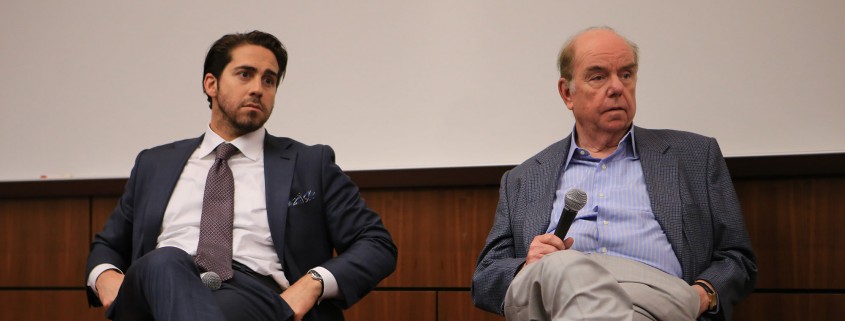Students Talk Back takes on Obama policies
The Jesse M. Unruh Institute of Politics hosted its weekly Students Talk Back event in the Ronald Tutor Campus Center on Wednesday afternoon. Students and panelists at the event discussed the domestic and foreign policy of President Barack Obama’s second term in office.
The discussion, entitled “Obama’s Second Term: Stronger at Home, Troubled Abroad,” focused on the president’s political trends since when he was first elected.
The panel featured Bob Shrum, a political consultant and the USC Dornsife Carmen H. and Louis Warschaw Chair in Practical Politics, and Michael Davidson, the CEO of Gen Next, a nonprofit organization that encourages success by expanding educational, economical and global security opportunities.
Co-moderators included Dan Schnur, director of Jesse M. Unruh Institute of Politics, and Nick Thomas, a member of the USC College Republicans.
Schnur fostered discussion among the panelists and audience members about Obama’s trends in foreign policy and his use of executive power to push through his policies.
“Now, Republicans have so much control over the House and the Senate,” Davidson said. “But I … think the center of gravity and the seat of power is still with the president.”
Shrum felt that the issue of whether Obama is overstepping his authority through executive order is more of a partisan one.
“Whether the president has too much power or not depends on if the president is in your party or not,” Shrum said. “The Republican effort to defunct the president’s efforts was always doomed to fail, and this leads to counterproductive effects for the Republicans, such as sanctions for Iran.”
According to Davidson, the American people don’t know what they want because of the massive flow of information from the media and distress within the government. He said this leads to an elected leader who doesn’t know how to lead.
“I would like the country to participate in a rigorous debate on the issue,” Davidson said. “The American people need to be more engaged in these topics, but if they’re going to be run on executive orders, then the American people won’t see it.”
Davidson said that as a panelist at the event, he wanted to get more people to think about these issues and to attract others to be a part of it.
“USC has a Dan [Schnur] for a reason,” Davidson said. “There are few people in the world that care so much about getting students and young people in leadership positions, and this is just one of the many examples of what Dan does to make that happen, so it was an honor to just be a small part of it.”
Schnur hopes to show students that disagreement is not necessarily a bad thing because it fosters conversation about the issues. Schnur said that the purpose of the panels is to bring people from different perspectives together for a discussion, not a fight. He said that he attempts to portray a model of discussion in which the participants respect each other’s intelligence, while acknowledging that they may come to different, but equally valid, conclusions.
John Vitzileos, a sophomore majoring in international relations and global business, enjoyed the conversational aspect of the event.
“There were probably 20 or 30 people here total, so getting to talk to them upfront, up close and getting their opinions on certain issues is something that you couldn’t get in big lecture, where they’re a little bit concerned with the things that would get recorded and put out there,” Vitzileos said.

